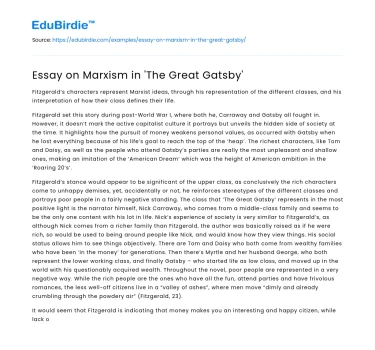Fitzgerald’s characters represent Marxist ideas, through his representation of the different classes, and his interpretation of how their class defines their life.
Fitzgerald set this story during post-World War I, where both he, Carraway and Gatsby all fought in. However, it doesn’t mark the active capitalist culture it portrays but unveils the hidden side of society at the time. It highlights how the pursuit of money weakens personal values, as occurred with Gatsby when he lost everything because of his life’s goal to reach the top of the ‘heap’. The richest characters, like Tom and Daisy, as well as the people who attend Gatsby’s parties are really the most unpleasant and shallow ones, making an imitation of the ‘American Dream’ which was the height of American ambition in the ‘Roaring 20’s’.
Save your time!
We can take care of your essay
- Proper editing and formatting
- Free revision, title page, and bibliography
- Flexible prices and money-back guarantee
Fitzgerald’s stance would appear to be significant of the upper class, as conclusively the rich characters come to unhappy demises, yet, accidentally or not, he reinforces stereotypes of the different classes and portrays poor people in a fairly negative standing. The class that ‘The Great Gatsby’ represents in the most positive light is the narrator himself, Nick Carraway, who comes from a middle-class family and seems to be the only one content with his lot in life. Nick’s experience of society is very similar to Fitzgerald’s, as although Nick comes from a richer family than Fitzgerald, the author was basically raised as if he were rich, so would be used to being around people like Nick, and would know how they view things. His social status allows him to see things objectively. There are Tom and Daisy who both come from wealthy families who have been ‘in the money’ for generations. Then there’s Myrtle and her husband George, who both represent the lower working class, and finally Gatsby – who started life as low class, and moved up in the world with his questionably acquired wealth. Throughout the novel, poor people are represented in a very negative way. While the rich people are the ones who have all the fun, attend parties and have frivolous romances, the less well-off citizens live in a “valley of ashes”, where men move “dimly and already crumbling through the powdery air” (Fitzgerald, 23).
It would seem that Fitzgerald is indicating that money makes you an interesting and happy citizen, while lack of this inevitably leads to a boring, ‘grey’ life in the valley of ashes.






 Stuck on your essay?
Stuck on your essay?

